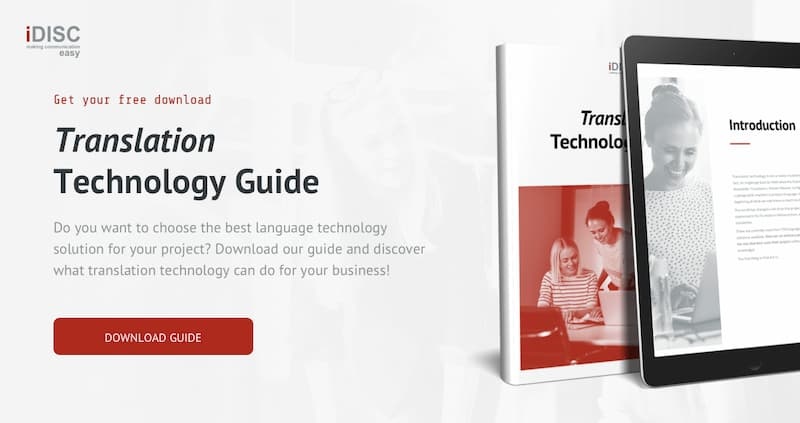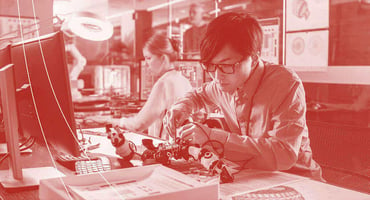Have you ever been assembling a piece of furniture or a household appliance and part of the instructions seemed impossible?
Mistranslations found in instruction manuals can lead to a host of misunderstandings.
For example, the label of a well-known clothing brand could say the following:
- “Hand wash, do not bleach. Do not tumble cool iron”.
And below, it is translated word for word into other languages reading as follows:
- “Hand is washed, not bleached. Do not fall iron cool”.
While amusing, these are the dangers of leaving translation to machine translation engines without professional oversight, or to translators not specialized in the industry.
This is where we need technical translation to deal with translations that require professionals to not only have a solid command of the language, but also to possess industry expertise and to know how to use the right terminology to convey the information as faithfully as possible to the source text.
A bad technical translation can lead to wrong conclusions and misuse of the product, not to mention a bad image for the company when communicating with users.
In this article we will cover what technical translation actually is and the main industries that need it.
Write this down!
What is technical translation: main features
Technical translation is defined as a type of translation specialized in technical subjects, i.e., texts with technical language and industry-specific terminology, such as instruction manuals, patents, product specification data sheets, user guides, work procedures, scientific reports, computer software and engineering or automotive publications, and many more.
Compared to other types of translation, which allow greater freedom to adapt content from one language to another, technical translations must be more rigorous, more accurate and use terminology that is usually industry specific.
This is why it is essential that technical translators have a solid understanding of the subject area and possess the tools and skills needed to ensure terminology remains consistent across the various components of a product’s documentation. Let’s look at an example applicable to everyday objects such as a printer, a cell phone or a digital alarm clock:
The Spanish term “Configuración” can be translated in different ways, and the printed instruction manual, the online help section, the software itself and the physical label of the product should use the same translation. If the device or program button is translated as Settings, a user will be puzzled if the instruction manual states “Click on Configuration” or “Click on Parameters”, even if all these translations are correct. The same is true if the start button on a machine reads Initiate and the instructions refer to it as Start.
A good technical translator, therefore, must not only know the standard industry terminology, but also the product-specific terminology and ensure that cross-references between the various translated texts match.
Technical translation is constantly evolving today and goes hand in hand with technologies that help professionals ensure consistent and accurate terminology. If you would like to know more about this, see our article “Discover the main translation tools and technologies.”
Translating technical language: When is it necessary?
With today’s globalization, technical translation has become even more important, and with good reason. Any product, finding, publication, or technical or scientific document can reach every corner of the world.
In other words, technical translation helps to break down language barriers and facilitate any commercial exchange as well as the dissemination of knowledge. This translation ensures that technical and specialized information is understandable and accessible to global audiences, covering everything from product documentation to scientific research. Given the specialized nature of these texts, it is essential that technical translators are not only linguistically competent, but also have training or experience in the specific field of the text to be translated.
Some of the industries that most frequently require technical translations are engineering, automotive, boating, mining, metallurgy, construction, chemistry, telecommunications and IT or electronics.
Types of texts requiring technical translation
Some types of texts that need technical translation include:
-
User manuals: Detailed instructions on how to use products, especially those concerning machinery or technology.
-
Software documentation: Software installation, user and troubleshooting guides.
-
Technical specifications: Detailed descriptions of products, including their components and operation.
-
Engineering documentation: Drawings, diagrams and other visual representations of engineering projects.
-
Scientific articles: Research and studies in fields such as physics, chemistry and biology, among others.
-
Medical documentation: Includes medication package inserts, medical equipment manuals and documentation related to clinical trials.
-
Patents: Technical descriptions of inventions and processes that are submitted to patent offices to protect intellectual property rights.
-
Regulatory and standards documents: Technical standards and industry-specific regulations.
-
Agricultural documents: Information on agricultural techniques, machinery and chemical products.
-
Environmental documents: Reports and studies on environmental topics, such as climate change, conservation, etc.
-
Technical training manuals: Training materials for technical and specialized areas.
-
Product data sheets: Summaries outlining the characteristics and specifications of a product.
-
Tender materials: Proposals and technical documentation for governmental or private projects.
How should technical language be translated?
One of the most common questions our clients have is whether the translation will be as consistent as the source, so we would like to offer a step-by-step explanation of the methodology used for successful technical translation:
- Choosing specialized translators.
- Reading the text before starting the translation.
- Documentation: thoroughly researching the subject of the translation is crucial.
- Identifying specialized terminology: every industry has specific terminology, so first we need to identify terms, study them and agree on them with the manufacturer, if appropriate.
- Translation of neologisms and foreign words: some languages do not always translate words such as WiFi, start-up, on/off, and many others as they are commonly used in English.
- Using terminology resources such as glossaries, specialized dictionaries, acronym dictionaries and translation memories to make translation easier.
- Reviewing and proofreading: language professionals proofread the translation comparing it to the source text and, if necessary, proofread the final version to ensure that the translation is not only correct but also sounds natural.
- When machine translation software is used, there is an added step of human post-editing: translation engines are still not error-free and post-editors confirm or correct machine-produced output to ensure that it fits the desired format and contains no mistakes.
- Automated quality checks: to minimize the risk of errors, tools are used to automatically check the terminology, formatting, numbers and internal consistency of documents.
Professional translators specialized in technical translations
Partnering with a professional translation agency specialized in technical translations for your industry ensures that the professionals working on your project not only know the language and culture they are working with perfectly, but also know the industry and its technical terminology.
We can only build business relationships abroad and connect with our consumers if we interact with them in their language.
If your industry uses very specific terminology, you will need to ensure that your translation provider is efficient and accurate, meets your project’s needs, and keeps your branding consistent across every language.
The solution for your technical translations
At iDISC, a professional translation agency, we possess over 30 years of experience and help our clients reach new markets. We fully understand the challenges of translating technical documents and just how important it is to have a professional translation agency to guide you through the process.
We have more than 2,000 native translators specialized in a variety of industries, who know how to work with industry-specific terminology. We can adapt to the individual needs of customers, which allows us to deliver translations for a wide variety of industries, including industrial machinery, electronics, ProAV, automotive, software, manufacturing, and many more.
If these reasons have convinced you that we are the perfect partner for your technical translation project, feel free to get in touch.
We hope you found this article useful. You can find more interesting content on our blog.





